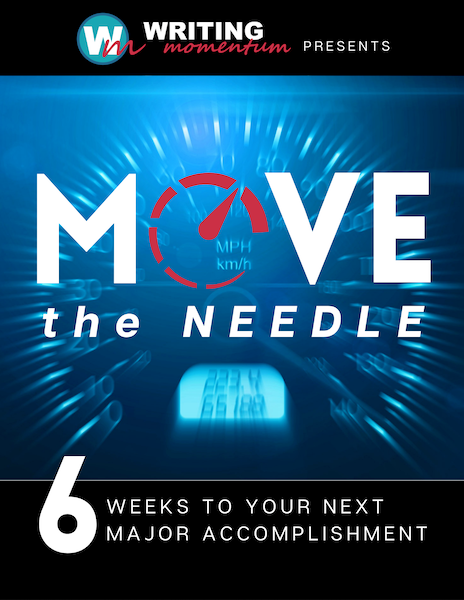Episode 110
Maintaining Motivation in Writing: Practical Tips
In this episode of the Writing Momentum podcast, hosts Gena and Christopher Maselli explore different ways to stay motivated in writing. They discuss tracking your writing successes, identifying your 'why', immersing oneself in the writing world through books, podcasts, and conferences, and the benefits of co-writing and surrounding yourself with writing friends. Chris also describes the benefits of maintaining a 'to done' list. The hosts invite audiences to join their writing group, Writing Moments, to further promote a supportive writing community. The episode is designed to help writers find the motivation they need to stay committed to their craft.
00:00 Introduction and Welcome
00:25 The Challenge of Staying Motivated
01:48 Tracking Your Successes
02:57 The Power of a 'To Done' List
07:17 Finding Your 'Why'
09:03 Keeping Your Head in the Writing World
10:06 The Benefits of Co-Writing
12:44 Surrounding Yourself with Writing Friends
15:27 Summary and Conclusion
LINKS:
- Liz Wilcox's Email Marketing Membership at http://wmdeal.com/liz
- Get your FREE Move the Needle goal-setting for authors ebook at https://www.writingmomentum.com
- Write with us! Join Chris, Gena, and Rene each Wednesday at noon Central and let's get our writing DONE! https://www.writingmoments.com
Transcript
How can you keep yourself motivated to write?
Speaker:Hey, we can help with that!
Speaker:Hi there.
Speaker:Welcome to the Writing Momentum podcast.
Speaker:I'm Gena Maselli and this is my husband, Christopher Maselli.
Speaker:So glad you're here.
Speaker:Wait, you're glad I'm here?
Speaker:I'm glad they're here.
Speaker:Oh, I'm glad they're here too.
Speaker:I'm glad I'm here and they're here and I'm glad you're here.
Speaker:Awesome.
Speaker:We're all glad that everyone's here.
Speaker:We're talking about motivation today.
Speaker:Last week we talked about the practical aspects of just finding time to write.
Speaker:This is something that I think we can all relate to the idea that finding
Speaker:time to write in a very busy world is sometimes hard, but so can be this
Speaker:idea of staying motivated to write.
Speaker:This is more, this isn't just a physical, man, I'm so busy in my day.
Speaker:It's more of an emotional connection of how can I really stay motivated
Speaker:and believe in my writing.
Speaker:You know why that is?
Speaker:You know why that can be hard?
Speaker:Because writing can be hard.
Speaker:It can be hard sometimes.
Speaker:Sometimes when you're writing, you're doing just fine, and then
Speaker:you wake up one day and you think Huh, that scene in that book I'm
Speaker:writing didn't quite come together, maybe I'll let it sit another day.
Speaker:And then you let it sit another day.
Speaker:And before you know it, it's easy to not get back to it because you know it's gonna
Speaker:be hard, it's gonna be difficult to do.
Speaker:And But what can break through that writer's block, if you will,
Speaker:is being motivated to write.
Speaker:And so today, yeah, that's what we're going to share are several ways
Speaker:that we find that we can motivate ourselves and that we've found that
Speaker:others have found ways that they can motivate themselves to write.
Speaker:Yeah.
Speaker:The first one we're talking about today is tracking your successes.
Speaker:This is sounds so simple, our brains are wired to remember our
Speaker:failures and our disappointments more so than our successes.
Speaker:And we have to work to overcome that.
Speaker:And I think part of that, is this idea of keeping track of the good.
Speaker:Keeping track of the things in our writing that we're thankful
Speaker:for, the things that we did right.
Speaker:And so when we're talking about tracking your successes the basic one
Speaker:is just if you write a certain number of words, go ahead and keep track
Speaker:of how many words you wrote today.
Speaker:How many words did you write and put that down?
Speaker:I'll sometimes I keep a paper planner still, but I will actually write
Speaker:that in my planner just so that I can, just so that I can see it.
Speaker:I'll put it on the month at a glance and I'll just write that in there.
Speaker:Just a little bit because what we have found is that a little will add
Speaker:up a little bit every day, or a few times a week, or even every week.
Speaker:It will add up into something pretty, pretty remarkable.
Speaker:Yeah, I like keeping not only my to do list that I refer to each day, but
Speaker:every day when I'm working, up in the upper right hand corner, I have a little
Speaker:notepad open with that day's date on it.
Speaker:And on that notepad, I'm talking about a digital notepad on my computer, I
Speaker:have what I call my to done list, right?
Speaker:These are all the things that I did that day.
Speaker:It's really like a journal of my work, right?
Speaker:So every time I accomplish something, finish writing something, make a
Speaker:phone call that I've been meaning to make, run an errand, whatever I do.
Speaker:I put on my to done list, right?
Speaker:This is not my to do list.
Speaker:That's what I need to do.
Speaker:This is my to done list, it's what I did.
Speaker:And this work journal is really motivating because so many times you can get to the
Speaker:end of a week or a month and think, what in the world did I even do this month?
Speaker:Did I even do any writing?
Speaker:And then you look back and realize all these wonderful
Speaker:things that you accomplished.
Speaker:It's very motivating.
Speaker:Now, let me ask you, Chris, because I know that's not something that you
Speaker:just woke up one day and started doing.
Speaker:That was a process that you came to that place of doing a to done list.
Speaker:And can you talk about that process?
Speaker:Sure.
Speaker:One day I woke up and I just came up with this idea.
Speaker:You did not.
Speaker:No, really it came out of this idea that I was starting to feel like, man, I am
Speaker:spinning my wheels all the time, right?
Speaker:I am not getting anything done and yet I knew at the end of the day I was like,
Speaker:I know I did a bunch today I couldn't even remember at the end of the day
Speaker:what I had done that day, I was so busy.
Speaker:And so I thought, you know just for my mental health I need to keep track of the
Speaker:things I do and maybe that will also help me show things that I don't need to do
Speaker:that I'm doing which is probably a whole nother episode, but it was a way for me to
Speaker:track those things for my mental health.
Speaker:And I got to tell you, it worked like a charm.
Speaker:Boy, to be able to get to the end of the day and look and see.
Speaker:Look, I accomplished all these things.
Speaker:I did what I needed to do.
Speaker:Now, I will tell you, I do pre plan my day to where I make sure I do something
Speaker:for a client each day, I do something for myself each day, do something for
Speaker:our business, and as I do those things, those move up into the to done list.
Speaker:And it's a way for me to see at the end of the day and feel like, oh,
Speaker:okay, I accomplished some things because I did some things for clients.
Speaker:I did some things for ourselves and I did some things for our business.
Speaker:And so it's, yeah, it's more of a mental health thing than anything for me.
Speaker:Yeah.
Speaker:I love that idea.
Speaker:And I have done it a little bit.
Speaker:I probably should do it more often because, but there have definitely been
Speaker:because I do print pre plan my week I will put check marks next to the things
Speaker:that I finally do and I've got the things on my list, so at the end of the
Speaker:week, I can actually see what I'm doing.
Speaker:But what you could do with that is even if you did it for everything
Speaker:that you do working with clients, working with your business, picking
Speaker:your kids up, going to this meeting, going to that meeting, whatever.
Speaker:When you get to the writing part, maybe you highlight it.
Speaker:Or maybe you add that to its own list that you just keep for the whole year.
Speaker:And I talked about keeping track of your words, how many words you write each day.
Speaker:But maybe you keep track of the number of minutes that you write each day.
Speaker:Because maybe you're not writing new things, you're editing.
Speaker:Maybe part of your writing process is that you edit what you wrote yesterday, and
Speaker:then you write a little bit more today.
Speaker:Whatever your process is Think about ways that you can just
Speaker:keep track of those successes.
Speaker:Yeah, and I think it, I should say things don't end up on my to done
Speaker:list usually unless they're on my to do list in the first place.
Speaker:So my writing has to be on my to do list, right?
Speaker:That's part of my motivation, knowing that's one of the
Speaker:things I need to do today.
Speaker:And I try to be very careful not to put so many things on my to
Speaker:do list that I can't do them all.
Speaker:So if my writing is on there, that's taking a slot of what I can do that day.
Speaker:And it makes it to where, okay.
Speaker:This is one of the things I have to do and honestly sometimes it helps you get
Speaker:your writing done a little more because when you look at all the things you
Speaker:have to do you think I could write for a half an hour, like I could do that.
Speaker:All these other things are gonna take a lot more brainpower than just me
Speaker:sitting down and doing the writing for my novel that I love doing, so it
Speaker:helps you get motivated to get it done.
Speaker:I love that.
Speaker:I love that the next thing that we have is another kind of mindset shift,
Speaker:and that is about finding your why.
Speaker:We talked about this a little bit in our last episode in finding time to write,
Speaker:but it's also about staying motivated to write, wanting to get your work done.
Speaker:And we've had the privilege of working with clients who really had a pretty
Speaker:strong why of why they were putting their writing out there that why
Speaker:they were getting their books done.
Speaker:Yeah, so just briefly.
Speaker:So finding your why, what that means, is finding why are
Speaker:you doing what you're doing.
Speaker:That's all that means.
Speaker:Why are you writing that book you're writing?
Speaker:And it may be something like if you're writing a book for your
Speaker:grandkids, that's your why.
Speaker:You want to share a story with them.
Speaker:If you're writing a memoir, it's I want to share my story with the world.
Speaker:If you're writing just a fun fiction novel, it's because you
Speaker:want to get your book out there.
Speaker:Maybe you want to hit a bestseller list or whatever it
Speaker:is, whatever your motivation is.
Speaker:Maybe you just want to get paid for your writing and you're like, I want to
Speaker:make $5, 000 by selling my book, right?
Speaker:That might be your why.
Speaker:We all have different reasons at different times in our lives and
Speaker:it's totally fine whatever yours is.
Speaker:But that's what you've got to find is what is the reason you want to write
Speaker:and then keep that in front of you because that will be so motivating.
Speaker:I think that's a key is keeping it in front of you, putting it on
Speaker:that sticky note that goes on your laptop or that's on your phone.
Speaker:Maybe it's a wallpaper or something.
Speaker:It's that home screen, maybe, or it's a wallpaper on your computer.
Speaker:Just whatever it is, a way to keep that in front of you so that your
Speaker:why is really there to remind you and motivate you to keep going.
Speaker:100%.
Speaker:Keep going.
Speaker:Hey, I'll tell you another way that you can find motivation for your writing,
Speaker:this is one near and dear to my heart, is to keep your head in the writing world.
Speaker:Here's what I mean by that.
Speaker:If you keep your thoughts on writing, you will write more.
Speaker:So how do you keep your thoughts on writing, right?
Speaker:You listen to podcasts like this one on a regular basis.
Speaker:You read books about writing.
Speaker:You attend writer's conferences.
Speaker:You take courses on writing to help you be a better writer.
Speaker:All of those things will help you fixate your mind on this
Speaker:whole writing world thing.
Speaker:If you like watching YouTube videos, watch YouTube videos on writing.
Speaker:Get those to start popping up in your playlist.
Speaker:Because when you do that, your mind will be in the right place and that's
Speaker:what this podcast is about today.
Speaker:You will find motivation.
Speaker:You will find yourself motivated to do those things that you listen to.
Speaker:Absolutely.
Speaker:And then our next tip is co writing.
Speaker:This is something that is really underestimated.
Speaker:Chris and I have a co writing group that we write with, it's Writing Moments.
Speaker:You can go to writingmomentum.
Speaker:com slash writing moments.
Speaker:And we have a group that we write with every Wednesday at noon central.
Speaker:Hey, join us if you want.
Speaker:Yeah, definitely.
Speaker:Everyone's welcome.
Speaker:The reason we do this is because when we were sitting down and
Speaker:really thinking about what we could offer the writing world.
Speaker:Chris and I have been writing now for you've been writing for 30 years.
Speaker:I've been writing for over 20 years.
Speaker:We've been in this world a long time.
Speaker:And what we're finding is that people Come to writers conferences or they
Speaker:have a vision of what they want to do, but then they go home and they're all
Speaker:by themselves and they don't always know where to start or how to keep
Speaker:going or how to get over the pitfalls.
Speaker:They just don't know and they need some help and the thing that we have found
Speaker:in all our years of writing is that writing really isn't a solitary thing.
Speaker:Writing is something you can do with other people you need to because other
Speaker:people help keep you accountable, they'll help you make your deadlines.
Speaker:They'll help you keep your motivation up right and they'll help keep
Speaker:you excited about being a writer.
Speaker:And that's worth every moment.
Speaker:And they'll also help teach you.
Speaker:You have a friend who all of a sudden is going, maybe they're traditionally
Speaker:published and they're going through that process and you're learning
Speaker:as they're telling you about it.
Speaker:If you don't know anybody who's been through that process, then,
Speaker:you don't really know what's normal.
Speaker:What's not normal.
Speaker:Where am I going?
Speaker:Do I want to be traditionally published?
Speaker:You know what?
Speaker:Maybe next time I should do it myself and gosh, if I want to do
Speaker:that, how am I gonna market it?
Speaker:How am I gonna find an editor?
Speaker:What is my book cover supposed to look like?
Speaker:All of these questions that writers have, you get to, when you're part
Speaker:of the writing community and the writing world, you find resources
Speaker:to help you navigate all of that.
Speaker:Absolutely, and that, that comes in terms of all these resources, but it's
Speaker:also about sometimes just saying, Hey, I need to write for 45 minutes today.
Speaker:Is there someone who will write with me?
Speaker:Who will sit down next to me and we'll just write together on our own projects.
Speaker:That's what we do in writing moments.
Speaker:That's what a lot of people will do this.
Speaker:They'll go to coffee shops together and they'll write together.
Speaker:Whatever you want to do, find a way.
Speaker:To motivate yourself to write by getting some co writing experience
Speaker:and that kind of goes right along with the last point that we have, which is
Speaker:surround yourself with writing friends.
Speaker:Surround yourself with other people who are also passionate about writing,
Speaker:who love to talk about writing, who are writing material themselves.
Speaker:Seeing other people get their writing done will help motivate
Speaker:you to get your writing done.
Speaker:And you may say Chris and Gena, I don't have any writing friends where I live.
Speaker:Hey, if you're connected to the internet, you've got writing friends.
Speaker:We're out here doing writing stuff with people all the time at writingmomentum.
Speaker:com.
Speaker:There's other people out there doing it.
Speaker:Find your writing community and join up with them.
Speaker:And that surrounding yourself with writing friends will just
Speaker:make you such a better writer.
Speaker:And you can go to conferences, but you can also look at your local library.
Speaker:A lot of times in areas there are writing groups that meet at libraries or
Speaker:Chris said, join us at writingmomentum.
Speaker:com.
Speaker:Or maybe you want to just, you have one friend and you both write.
Speaker:You don't have to write the same genre.
Speaker:Your friend may be somebody who journals and you're writing a simple,
Speaker:I say simple, writing is never truly simple, but maybe you're writing a
Speaker:fun beach read and it's this novel.
Speaker:That is okay.
Speaker:Maybe your friend is writing a memoir and you're writing something else.
Speaker:You're writing poetry.
Speaker:It doesn't matter.
Speaker:It's just about having those friends next to you to encourage you to
Speaker:read each other's stuff and get excited about it, to make suggestions
Speaker:about how to make it better.
Speaker:That is priceless.
Speaker:Having those people, that connection, having that
Speaker:encouragement, it's just priceless.
Speaker:You can't beat it.
Speaker:And I say that because I have met so many people who say, I want to write, but
Speaker:the only people I have around me, are my family members and maybe, sadly, there are
Speaker:the times where they say my family members don't understand my passion for writing.
Speaker:They don't understand what the big deal is and why I even want to do this.
Speaker:You need to get some writing friends.
Speaker:But also, my family members, they love and support me, but all they
Speaker:do is tell me how great my stuff is.
Speaker:And you know what?
Speaker:I think I need some help making it better.
Speaker:You know what?
Speaker:You need some writing friends.
Speaker:That's what your writing friends will help you.
Speaker:I have learned so much from writing friends over the years that just that
Speaker:little nugget that they will share that all of a sudden makes all the difference.
Speaker:And then I implement it into my writing and I, it's just getting better and better
Speaker:all the time just because of those people.
Speaker:That's been so good.
Speaker:You know what I want to do I'm motivated right now to start writing.
Speaker:You want to get right?
Speaker:I want to go right.
Speaker:All right.
Speaker:So here's the here's some things we talked about today First of all,
Speaker:you want to track your successes.
Speaker:When you write, find a way to get down on your calendar, how many
Speaker:words you wrote that day, or on your to done list, what you accomplished
Speaker:when it comes to your writing.
Speaker:Write those down every day so that you can look back and be motivated.
Speaker:by how much action you're taking.
Speaker:Second, find your why.
Speaker:Why are you writing?
Speaker:Knowing why you're writing what you're writing is very motivating.
Speaker:Third, keep your head in the writing world.
Speaker:Listen to podcasts like this one, read writing books, go to conferences, take
Speaker:writing courses, anything like that will keep your head in the writing world.
Speaker:And then of course, it always helps to co write with others.
Speaker:Go to a coffee shop, jump online with us at writingmomentum.
Speaker:com or some other online space and write with other writers.
Speaker:And then finally, surround yourself with writing friends.
Speaker:When you surround yourself with others who are also loving this
Speaker:craft, you're going to find yourself motivated and loving it too.
Speaker:Yeah, definitely.
Speaker:Those are so good.
Speaker:We are so glad that you joined us today on Writing Momentum.
Speaker:We hope that you will rate, review, subscribe, and share this podcast with
Speaker:someone who might need some motivation to keep going in their writing.
Speaker:And we are very passionate about this.
Speaker:We really do hope that you will reach out to us at writingmomentum.
Speaker:com.
Speaker:We've got some free resources there for you as well, because
Speaker:we truly believe that together
Speaker:we have writing momentum.
Speaker:Bye bye.





